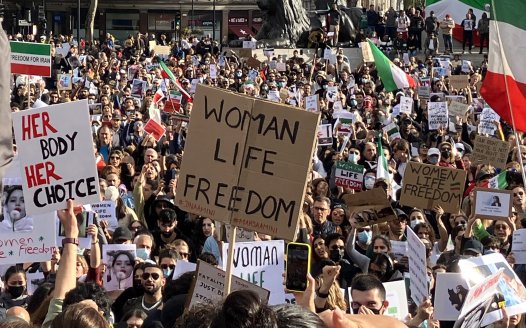Britain’s first women’s mosque: rise of girl power or a Muslim women’s ghetto?
Posted: Tue, 8th Mar 2016 by Aisha Nabi
Muslim women are no different to their Western sisters who fought their battle for equality decades ago, writes Aisha Nabi. Muslim women are fighting the same evil as Western sisters are today – sexism, but what is the best way of achieving gender equality?
Last August, a group of women in Bradford launched a consultation, on what seems at first glance an innovative and radical proposal: the establishment of a mosque run for and by women. At a time when Islam is perpetually challenged on gender equality issues, the mosque is a stepping stone to empowering women as equals in Muslim society. But this alone won't be enough.
Bana Gora and her team at the Muslim Women's Council (WMC) proposed a mosque for all community groups and religious sects, including Sunni and Shia Muslims. The liberal literati often complain that the upper echelons of British society are controlled by white, middle class, middle-aged Protestant men. Less known is that the management committees of most mosques consist of elderly men who live in the UK, but emotionally reside in rural Bangladesh or Pakistan. This conservative, agrarian, third world mind set, riven with cultural and sexual prejudices is ill-equipped to cope with the challenges of an urban multi-cultural society.
In their cultural paradigm, the role of women is to fulfil their duties as a good wife and mother - 'stay-at-home mums' or 'house-makers'. Modern women have other goals. A disconnect between so-called community leaders and the younger population causes tremendous tensions, that can fuel radicalisation in a search for an alternative.
"The alienation that women feel has profound consequences for younger generations who are taught that Islam treats both men and women as spiritual equals… the practice within mosques contradicts the principles," Bana Gora told the Guardian .
Encouraging women to become socially active within the Muslim community will enable them to become vigilant for any signs of radicalisation within family or peer groups and empower them to voice concerns. Educational programs for women in English, such as the Prime Minister's recent £20 million initiative, can open opportunities for more effective integration in British society. But efforts to improve the role of women must also come from Muslim communities themselves.
A mosque, in the traditional Islamic sense, is not simply a place of prayer. It is intended as a community hub, a meeting place to discuss ideas and solve problems. Gora's female mosque will host surgeries and support groups to tackle domestic violence, divorce, bereavement, parenting and legal advice. For Gora, it is crucial women do not feel isolated, but rather are respected and encouraged to express themselves. A weekly women's social circle event will provide a forum for women to practice English, to discuss the challenges of modernity, advance their independence, solidify their identity, and raise awareness of current affairs.
Uzami Kazi, a 29-year-old community artist, commented in the Guardian, "There's lots of myths about women going to mosques, and what they can and can't do there, so education is really important",and added,"I really hope [the mosque] can be a safe space for 'me time', sharing wisdom and space to explore challenging things in the community, as well as celebrating the good times."
In some respects, however, women continue to take a back seat to male religious leaders. A male imam will still lead prayers, even though Islam imposes no stricture on the gender of its imams. The Prophet's wives Aisha Siddiqa and Umm Salama led prayers. Yet in Islam, as in Catholicism with male priests leading convents, men continue to be viewed as the most authentic spiritual leaders. In allowing a male imam to oversee the spiritual needs of its female constituency, the mosque's organising committee falls victim to the very cultural traditions it wishes to challenge.
A healthy dose of scepticism of initiatives for female emancipation is advised. Generations of male cultural interpretation have enshrined a rigid segregation of sexes within Islam. Some initiatives reinforce this.
Last week, Pakistan announced an initiative that will allow female doctors to consult patients online. Although hailed as a fantastic project, permitting many female doctors (whose husbands and family discourage full-time work) to practice and providing millions of women easier access to healthcare, the initiative overlooks the core issue – that the majority of students in Pakistani medical schools are female, yet most do not pursue a full-time medical career. A poor country like Pakistan can ill-afford such profligacy. Rather than treating the symptom, surely we should be looking at the root cause of the problem: institutionalised misogyny.
In this regard, Muslim women are fundamentally no different to their Western sisters who fought their battle for equality decades ago. In fact, Muslim women are fighting the same evil as Western sisters are today – sexism.
Endeavors such as Gora's female-managed mosque and 'The Inclusive Mosque Initiative' – which welcomes former Muslims to examine identity issues and the multiplicity of Muslim culture – can allow underrepresented community members to express themselves and seek solidarity. But they are only the beginning. According to Lindsay Beyerstein, the main religious argument for male supremacy narrows down to the assertion that men's superior position in society is somehow ordained by God. In the Christian origin myth, man was created in the image of God and woman was created in the image of man as his handmaiden and helpmate. This is what philosophers call a teleological argument: Women should serve men because that's what God made them for. Without God, the argument fails. Similarly, misinterpretations of Islam can often fall in this same deception.
So, why should the secular movement concern itself with feminism? For one thing, organized religions have been, and continue to be, a major source of female oppression. Opposing sexism is already de rigueur in organized atheism as long as criticism is directed toward religious bigots.
As long as religious bigots still coexist in today's modern age, it still remains a current and problematic area in terms of gender equality.
Aisha Nabi is a Researcher at the Quilliam Foundation, the world's first counter-extremism think tank. The views expressed in our blogs are those of the author and may not represent the views of the NSS.







